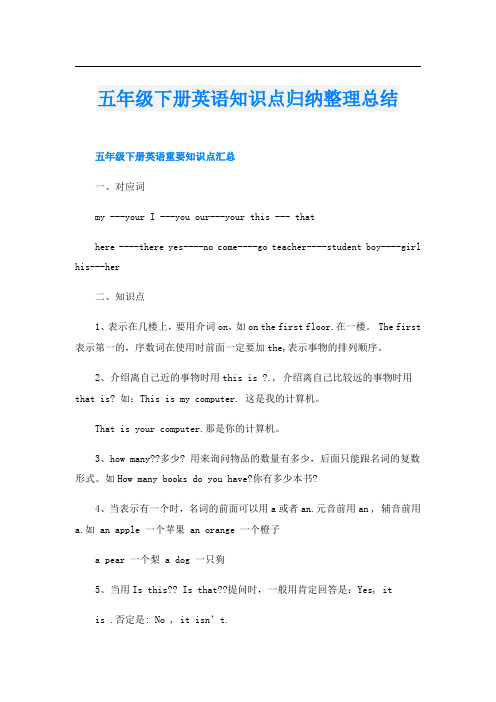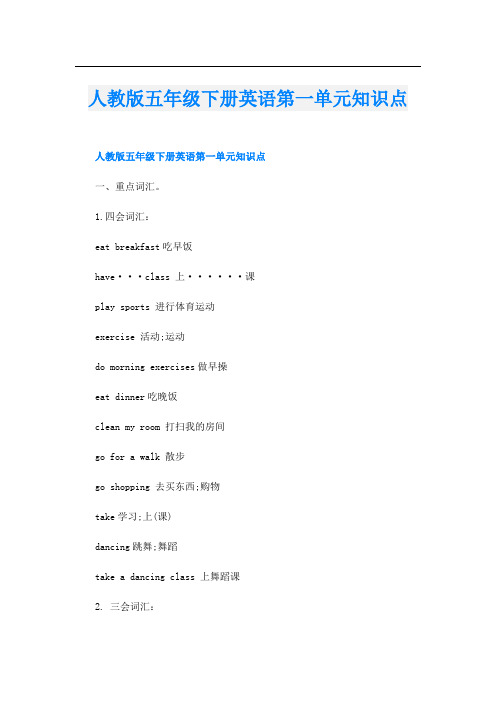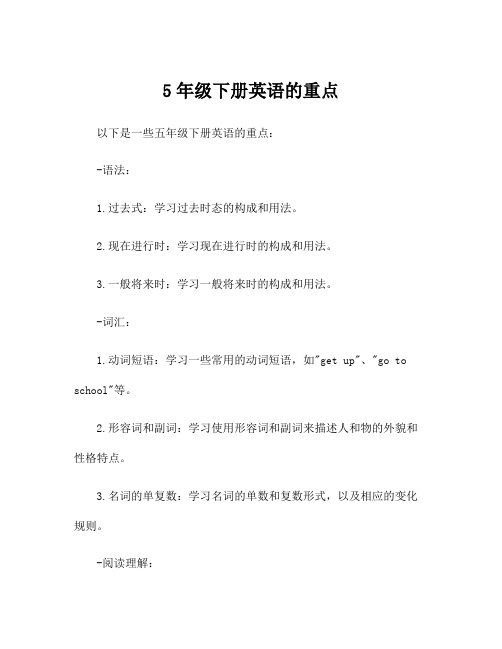五年级下册英语知识点
五年级下册英语知识点归纳整理总结

五年级下册英语知识点归纳整理总结五年级下册英语重要知识点汇总一、对应词my ---your I ---you our---your this --- thathere ----there yes----no come----go teacher----student boy----girl his---her二、知识点1、表示在几楼上,要用介词on,如on the first floor.在一楼。
The first 表示第一的,序数词在使用时前面一定要加the,表示事物的排列顺序。
2、介绍离自己近的事物时用this is ?., 介绍离自己比较远的事物时用that is? 如:This is my computer. 这是我的计算机。
That is your computer.那是你的计算机。
3、how many??多少? 用来询问物品的数量有多少,后面只能跟名词的复数形式。
如How many books do you have?你有多少本书?4、当表示有一个时,名词的前面可以用a或者an.元音前用an , 辅音前用a.如 an apple 一个苹果 an orange 一个橙子a pear 一个梨 a dog 一只狗5、当用Is this?? Is that??提问时,一般用肯定回答是:Yes, itis .否定是: No , it isn’t.三、句子:1、This is the teacher’s office.这是老师办公室。
2、That is my classroom.那是我的教室。
3、Go to the library. Read a story-book..去图书馆。
读故事书。
4、Is this the library? Yes, it is.这是图书馆吗?是的。
5Is that the art room? The art room is on the second floor.那是美术室吗?不是,美术室在二楼。
人教版小学英语五年级下册各单元知识点

人教版小学英语五年级下册各单元知识点Unit 1 At the zooVocabulary1.zoo 动物园2.cage 笼子3.lion 狮子4.elephant 大象5.giraffe 长颈鹿6.bear 熊7.monkey 猴子8.camel 骆驼9.kangaroo 袋鼠10.penguin 企鹅Sentence patterns1.询问动物去哪里了 Where is the lion/elephant/bear?2.描述动物在哪里There’s a lion/elephant/bear in the cage.3.描述动物是什么样的 What does the lion/elephant/bear look like?4.描述动物在做什么 The monkey is jumping./The camel is walking. Unit 2 My school dayVocabulary1.school day 学校日2.subject 学科3.math 数学4.English 英语5.science 科学6.PE 体育7.art 美术8.music 音乐9.Chinese 语文Sentence patterns1.询问你有哪些学科 What subjects do you have?2.询问你最喜欢的学科是什么What’s your favorite subject?3.描述你正在上什么学科I’m having math/English/science class now.4.询问你在哪个班级 What class are you in?Unit 3 At a partyVocabulary1.party 派对2.balloon 气球3.present 礼物4.birthday 生日5.cake 蛋糕6.candle 蜡烛7.card 卡片Sentence patterns1.询问你们在庆祝什么 What are you celebrating?2.询问你送了什么礼物 What present did you bring?3.描述蛋糕上有多少个蜡烛 There are four candles on the cake.4.描述你在派对上吃了什么 I ate cake and drank soda.Unit 4 My clothesVocabulary1.clothes 衣服2.jacket 夹克衫3.shirt 衬衫4.dress 连衣裙5.skirt 短裙6.pants 裤子7.socks 袜子8.shoes 鞋子Sentence patterns1.询问你喜欢穿什么样的衣服 What clothes do you like to wear?2.询问今天你穿了什么衣服 What clothes are you wearing today?3.描述你的外套是什么样的 My jacket is blue.4.描述你的鞋子是什么颜色的 My shoes are red.Unit 5 My familyVocabulary1.family 家庭2.mother 母亲3.father 父亲4.sister 姐妹5.brother 兄弟6.grandmother 奶奶7.grandfather 爷爷8.aunt 阿姨9.uncle 叔叔Sentence patterns1.询问你有几口人家庭 How many people are there in your family?2.询问你和家人一起住吗 Do you live with your family?3.描述你的妈妈是什么样的 My mother is kind.4.描述你和兄弟姐妹的关系很好 My sister and I get along well.。
小学英语人教版PEP五年级下册1-6单元知识点总结

Unit1 My day一、基本句型1.询问什么时候做某事:- When do you ……?你什么时候……?- I usually…at …. 我通常在…(点钟)…。
例:-When do you eat breakfast?-I eat breakfast at 7:00.2.What do you do on the weekend?你周末做什么?- I +频率副词+周末活动+时间。
或Sometimes I+周末活动例句:I sometimes go shopping with my mum on the weekend.(周末我时候和妈妈一起去购物)二、知识点:1.频率副词:always(总是,一直)>usually(通常)>often(经常)>sometimes(有时)2.只有Sometimes可以放在句首。
(Sometimes I cook dinner.)3.On the weekend 在周末on Saturdays 在周六on Sundays在周日(别忘加s)Unit2 My favourite season1.-Which season do you like best? (你最喜欢哪个季节?)Why?(为什么)-I like +季节+ best.(I like spring∕summer∕fall∕winter best) Because ___________.(因为)或:-What‘s your favourite season? -My favourite season is spring∕summer∕fall∕winter.2.-Why do you like winter best?(你为什么最喜欢冬天?) -Because______.二、知识点:1.leaf(树叶):复数leaves2.W,W真神奇,问出许多大问题。
what,what,问“什么”,when,when,问“时间”,where,where,问“哪里”,which,which,“哪一个”,why,why,“为什么”.Unit3 My school calendar补充:1.Dragon Boat Festival 龙舟节或端午节(农历五月五日)一般在阳历6月2.月份首字母大写。
五年级下册英语知识点(打印版)

五年级下册英语知识点(打印版)语法知识点1. 一般现在时:这个时态用于描述惯性的动作或重复发生的情况。
例如:I eat breakfast every morning.(我每天早上吃早餐。
)2. 一般过去时:这个时态用于描述过去发生的事情。
例如:He watched a movie last night.(昨晚他看了一部电影。
)3. 将来时:这个时态用于描述将来要发生的事情。
例如:She will visit her grandparents next week.(下周她将去看望她的祖父母。
)4. 现在进行时:这个时态用于描述正在进行的动作。
例如:They are playing soccer in the park.(他们正在公园里踢足球。
)5. 情态动词:情态动词用来表示能力、建议、允许等情态。
例如:Can you swim?(你会游泳吗?)词汇知识点1. 动物:cat(猫)、dog(狗)、elephant(大象)、tiger(老虎)、lion(狮子)2. 食物:apple(苹果)、banana(香蕉)、orange(橙子)、watermelon(西瓜)、cake(蛋糕)3. 数字:one(一)、two(二)、three(三)、four(四)、five(五)4. 颜色:red(红色)、blue(蓝色)、yellow(黄色)、green (绿色)、purple(紫色)5. 学科:English(英语)、math(数学)、science(科学)、history(历史)、art(艺术)句型知识点1. How old are you?(你几岁了?)2. What's your favorite color?(你最喜欢的颜色是什么?)3. Can I have a piece of cake?(我可以吃一块蛋糕吗?)4. Where is the library?(图书馆在哪里?)5. What time is it?(现在几点了?)交际用语知识点1. Greetings(问候):Hello!(你好!)、Good morning!(早上好!)、How are you?(你好吗?)2. Introductions(介绍):My name is...(我的名字是...)、Nice to meet you!(很高兴认识你!)3. Requests(请求):Can I borrow your pencil?(我可以借用你的铅笔吗?)、Please help me.(请帮助我。
人教版五年级下册英语第一单元知识点

人教版五年级下册英语第一单元知识点人教版五年级下册英语第一单元知识点一、重点词汇。
1.四会词汇:eat breakfast吃早饭have···class 上······课play sports 进行体育运动exercise 活动;运动do morning exercises做早操eat dinner吃晚饭clean my room 打扫我的房间go for a walk 散步go shopping 去买东西;购物take学习;上(课)dancing跳舞;舞蹈take a dancing class 上舞蹈课2. 三会词汇:when什么时候 after 在(时间)后 start 开始 usually 通常地;惯常地Spain 西班牙 late 晚;迟a.m. 午前;上午p.m. 午后;下午why 为什么 shop 去买东西;购物 work 工作last 上一个的;刚过去的sound 听起来好像also 还;也 busy 忙的 need 需要 play 戏剧;剧本letter 信 live居住 island 岛always 总是;一直 cave 山洞;洞穴go swimming 去游泳 win 获胜二、其他日常活动。
get up起床eat lunch吃午饭go to bed 上床睡觉wash my face洗脸wash my clothes 洗我的衣服watch TV看电视play ping-pong打乒乓球play the pipa弹琵琶go swimming去游泳go running去跑步do homework 做作业do kung fu练武术play football踢足球play basketball打篮球三、频度副词。
always总是,一直(100%) usually通常(80%) often 经常(60%) sometimes(30%)有时四、疑问词。
五年级下册英语知识点 打印

注:begoing to 问 be going to 答
1.询问对方计划的句型及回答
What you
do ? 你打算做什么?
I’m going to stay at home and watch TV. 我 打算待在家看电视。
2.any和some的用法
3.in a tree和on a 4.should的用法
注;be going to翻译成“打算或计划”+v.原
1.be going to的常用句型结构
I’m going to read a story every day.我打算每天阅 读一个故事。
I’m not going to go shopping tomorrow. 明天我不打算去购物。
What are they going to buy? 他们打算买什么?
例如:about nine a.m. 大约上午九点
—What’s wrong with you? 你哪里不舒服?
3. 让别人提供建议的句型 should 情态动词+v.原 You should take some medicine.你应该吃药。
You shouldn’t go to bed late.你不应该很晚上床睡觉。
2.will构成的一般疑问句
Will Kitty be a teacher? 凯蒂将成为一名教师吗?
3.询问某人将要做什么的句型
What will Peter/Alice do? 彼得/爱丽丝将做什么?
4.询问某人将要住在哪里的句型
Where will he/she live?他/她将住在哪里?
Unit4
for 对于
It’s a wonderful place for a holiday.它是一个度假的好地方。3.by+交通工具
5年级下册英语的重点

5年级下册英语的重点
以下是一些五年级下册英语的重点:
-语法:
1.过去式:学习过去时态的构成和用法。
2.现在进行时:学习现在进行时的构成和用法。
3.一般将来时:学习一般将来时的构成和用法。
-词汇:
1.动词短语:学习一些常用的动词短语,如"get up"、"go to school"等。
2.形容词和副词:学习使用形容词和副词来描述人和物的外貌和性格特点。
3.名词的单复数:学习名词的单数和复数形式,以及相应的变化规则。
-阅读理解:
1.短文理解:学习如何根据短文内容回答问题。
2.推理判断:学习通过对短文中信息的推理和判断,进行问题回答。
-口语表达:
1.日常交际用语:学习一些日常生活中常用的交际用语,如问候、请求、道谢等。
2.对话练习:通过对话练习,培养听说能力。
3.情景对话:学习在特定情境下进行对话交流。
-写作技巧:
1.句子结构:学习如何组织和连接句子,使文章流畅。
2.简单的写作练习:学习如何描述人、物、事件等,以及如何按
照时间顺序组织自己的写作。
这些只是五年级下册英语的一部分重点,具体的重点内容可能会
因不同教材和学校的教学要求而有所不同。
建议您根据教材和老师的
指导,仔细学习相关内容。
五年级英语下册总复习资料 (注意:四会单词.词组.句子指都要会听.说.读.写.)

五年级英语下册总复习资料(注意:四会单词.词组.句子指都要会听.说.读.写.)Unit 1 My day一.四会词组do morning exercises晨练eat breakfast吃早饭have…class上…课play sports做运动eat dinner吃晚饭clean my room打扫房间go for a walk散步go shopping购物take a dancing class 上舞蹈课二.四会句子1.When do you finish class in the morning? 你们上午的课到几点结束?We finish class at 1 o’clock. 我们一点钟结束上午的课.2.What do you do on the weekend? 你周末做什么?I often watch TV and play ping-pong with my father.Unit 2 My favourite season一.四会词组spring春天summer夏天autumn秋天winter冬天season季节go on a picnic 去野餐pick apples 摘苹果make a snowman 堆雪人go swimming 去游泳二.四会句子1.Which season do you like best? 迈克,你最喜欢哪个季节?Winter . 冬天.2.Why? 为什么?Because I like summer vacation ! 因为我喜欢暑假!三、重要知识点1.形容天气的形容词warm 暖和的hot 炎热的cool凉爽的cold 寒冷的sunny晴朗的cloudy 多云的rainy多雨的windy 多风的snowy下雪的2.特殊疑问词what“什么”对事物进行提问(what color,what time)where“在哪儿”对地点状语进行提问which“哪一个”对具体事物提问why“为什么”对because引导的原因状语从句进行提问when“什么时候”对时间状语进行提问(who“谁”对人物名字或身份进行提问whose“谁的”对名词所有格或物主代词提问)语法考点:1.which 引导的特殊疑问句,询问别人最喜欢的季节句型及回答.句型结构:问:which season do you like best? (你最喜欢的季节是哪一个?)答:I like+季节+best或直接说季节名称.同义句还有:What’s your favourite season?(你最喜爱的季节是什么?)My favourite season is +季节或直接说季节名称.例:---Which season do you like best? ---I like spring best./Spring---What’s your favourite season? --- My favourite season is spring./Spring.2. why引导的特殊疑问句,询问别人喜欢某个季节的原因的句型及回答.句型结构:问:Why do you like+季节名称?或直接用Why?答:一般要用“because”引导的句子来说明理由,可以从天气或相关的活动等方面来说.例:---Why do you like summer? ---Because I can go swimming every day.(你为什么喜欢夏天?)(因为我每天都能去游泳.)---Why do you like autumn?---Because the weather is cool.(你为什么喜欢秋天?)(因为天气凉爽.)3.询问别人天气怎么样的句型及回答.句型结构:问:What’s the weather like+时间+地点?(···天气怎么样?)答:It’s + 表示天气的形容词例如:---What’s the weather like in winter in Beijing?(北京冬天的天气怎么样?)---It’s cold and windy.(有风而且寒冷.)Unit 3 My school calendar一.四会单词:Jan./January一月Feb./February二月Mar./March三月Apr./April四月May五月June六月July七月Aug./August八月Sept./September九月Oct./October十月Nov./November十一月Dec./December十二月二.四会句子1.When is the party? 聚会什么时候举行?It’s in April . 在4月.2.When is the trip this year? 今年的(秋)游在什么时候?It’s in October . We’ll go to the Great Wall . 在10月.我们将去长城.三.重要知识点:1.关于月份:(1)五月May , 六月June, 七月July,没有简写形式.九月September 的简写形式是前四个字母加点Sept. 其他八个月的简写形式是前三个字母加点.(2)无论是完全形式还是简写形式,表示12个月的单词的第一个字母都要大写.表示在某年.某月.某个季节,某个时候(在上午,在下午,在晚上)用in;表示在具体的某一天.星期几时用on;表示在具体的几点几分用at.语法考点:When引导的特殊疑问句,就什么时候过节日或举行活动进行问答:--- When is + 节日或活动?--- It's in +月份.或者--- It's on +具体某一天 .例:--- When is Tree Planting Day? --- It's in March./ ---It’s on March 12th .---When is Teachers’Day? ---It’s in September./ ---It’s on September 10th.Unit 4 When is Easter?一.四会单词first(1st)第一(的) second(2nd)第二(的) third(3rd) 第三(的) fourth(4th) 第四(的) fifth (5th)第五(的) twelfth(12th)第十二(的) twentieth(20th)第二十(的) twenty-first(21st)第二十一(的)twenty-third(23rd)第二十三(的) thirtieth(30th)第三十(的)二.四会句子1.When is April Fool’s Day? 愚人节是哪天?It’s on April 1st. 它在4月1日.2.When is your birthday? 你的生日是哪天?My birthday is on April 4th. 我的生日在4月4日.三.重要知识点1.回答生日的两种表达:When is your birthday?My birthday is in June . 如果只说明生日在几月份,在月份前用in. My birthday is on June 9th .如果要说明生日是在几月几日,在具体的某一天用on.2. 注意区分两个句子:What day is it today? 今天星期几?It’s Monday./Today is Monday. 今天是周一.What’s the date today? 今天是几月几日?It’s April 24th. 今天是4月24日.e ; ve要用f替;整十基数变序数,先把ty变成tie;要是遇到几十几,前半基数后半序.语法考点:When引导的特殊疑问句,就别人什么时候过生日进行问答:--- When is + 人称(my/your/his/her/人名’s/称呼’s)+birthday?--- 人称+birthday is on +具体日期.例:--- When is my birthday? --- Your birthday is on March 20th.---When is your birthday? ---My birthday is on March 20th.---When is his birthday? ---His birthday is on March 20th.---When is Amy’s birthday? ---Her birthday is on March 20th.Unit 5 Whose dog is it ?一.四会单词mine我的yours你(们)的his他的hers她的theirs他们的;她们的;它们的ours 我们的climbing(climb的-ing形式)(正在)攀登;攀爬eating(eat的-ing形式) (正在)吃playing(play的-ing形式) (正在) 玩耍jumping(jump的-ing形式)(正在)跳drinking (drink的-ing形式)(正在)喝(水) sleeping(sleep的-ing形式)(正在)睡觉二.四会句子1. The yellow picture is mine.那幅黄颜色的画是我的.2. Are these all ours? 这些都是我们的画吗?3. Whose is it? 这是谁的?It’s Zhang Peng’s. 是张鹏的.4. Is he drinking water?它在喝水吗?No, he isn’t. He’s eating.不是.它在吃东西.三.重要知识点:2. 动词变为现在分词(加ing)的规则:(1)一般情况下,在动词的后面直接加ing.如:play—playing clean—cleaning draw—drawing cook—cooking(2) 以单个不发音的字母e结尾的动词,去掉不发音的字母e,再加ing .如: take—taking make—making dance—dancing have —having注意:如果单词结尾的e发音,则不能去掉,也直接加ing. 例如:see -seeing(3) 以重读闭音节结尾的动词,如果词尾只有一个辅音字母,则要先双写这个辅音字母,再加ing.如:run—running swim—swimming sit—sitting语法考点:1.What引导的特殊疑问句,谈论人或物的动作:单数:--- What is it / he / she doing? --- It's / He's / She's +动词的ing形式.例:--- What is it doing? ---It's eating bananas.复数:--- What are they doing? --- They are +动词的ing形式. 例:--- What are they doing? ---They're swimming.2. What引导的特殊疑问句,直接提问对方正在干什么:--- What are you doing? --- I'm +动词的ing形式.例:--- What are you doing? --- I'm singing.3. Is引导的一般疑问句,谈论单数的人或物是否正在进行某活动.--- Is he/she/it+动词的ing形式? --- Yes, he/ she /it is.或---No, he/she/it isn't.例:---Is he playing football? ---Yes, he is.--- Is it drinking water? ---No, it isn’t.4. Are引导的一般疑问句,谈论复数的人或物正在进行的活动:--- Are you /they/ +动词的ing形式?--- Yes, we/theyare. / No, we /they aren't.例:--- Are you eating lunch? --- No, we aren't.---Are they eating lunch?---Yes, they are.Unit 6 Work quietly!一.四会单词doing morning exercises (正在)做早操having …class (正在)上…课eating lunch(正在)吃午饭reading a book (正在)看书listening to music(正在)听音乐keep to the right 靠右keep your desk clean保持你的课桌干净talk quietly 小声讲话take turns 按顺序来二.四会句子1. What are they doing? 它们在干什么?They’re eating lunch. 它们在吃午饭.2. What’s the little monkey doing? 那只小猴子在干什么?It’s playing with its mother.它在和妈妈玩耍.3. Shh. Talk quietly. 嘘,小声讲话.4. Keep your desk clean. 保持桌面整洁.2. 现在进行时:现在进行时表示动作发生的时间是“现在”,动作目前的状态是“正在进行中”.可用来表示现在进行时的时间状语(now / Look! / Listen!)三.重要知识点:现在进行时的构成是: 主语+be+动词的ing形式〔现在分词)第一人称单数I+am+动词的ing形式. 例:I am walking.第一人称复数We+are+动词的ing形式. 例:We are walking.第二人称单(复)数You+are+动词的ing形式例:You are walking.第三人称单数He(She,it)+is+动词的ing形式例:He(She/it) is walking.第三人称复数They+are+动词的ing 形式例:They are walking.肯定句:主语+be(am/is/are)+现在分词(动词ing形式)否定句:主语+be(is/am/are)+not+现在分词(动词ing形式)一般疑问句:be(is/am/are)+主语+现在分词(动词ing形式)例:Is he eating? Are you sleeping?特殊疑问句:特殊疑问词+相应be动词+主语+现在分词+其他?例:What are you doing? What is your mother doing?语法考点:同第五单元语法考点作文范文My day我的一天Hi,I’m ....(你好,我是...)I often get up early.( 我经常起得很早.)I eat breakfast at 7:00 in the morning.(早上7点我吃早饭.)Then I do my homework.( 然后我做家庭作业.)After lunch,I can watch TV with my father.(午饭后,我可以和我父亲看电视.) I can play ping-pang with my friends.(我可以和我的朋友打乒乓球.)I can listen to music in the evening.(晚上我可以听歌.)It is so funny.(我想那太有趣了.)This is my day.(这是我的一天.)My weekend我的周末On Saturday, I often do morning exercises at 8:00 in the morning,and do my homework at 3:00 in the afternoon.(星期六,我经常在早上8点做晨练,下午3点做家庭作业.) On Sunday, I always play sports in the morning and read some books in the afternoon.(星期天,我总是在早上做体育运动,下午看书.) After dinner, I often watch TV with my parents.(晚饭后,我经常和我的父母看电视.) At that time, I can talk with my parents.(在那个时候,我可以跟父母交谈.) We often have a good time.(我们经常玩得很愉快.)My favorite Season我最喜欢的季节My favorite season is spring. (我最喜欢的季节是春天.)In spring, the weather is warm and windy.(在春天,天气温暖多风.)I can fly kites.(我可以放风筝.)And I can go on a picnic with my family .(我可以和我的家人去野餐.)There are beautiful flowers everywhere.(到处有漂亮的花.So I like spring best.(因此我最喜欢春天.)My favorite seasonMy favorite season is summer, summer is very hot.(我最喜欢的季节是夏天,夏天很热.) But it’s good for sports.(但是它很适合运动.) I like swimming best.(我最喜欢游泳.)I often go swimming with my friends in summer.(夏天我经常和我的朋友去游泳.) In summer we can eat ice cream and some fruit.(夏天我们可以吃冰淇淋和水果.)My family我的家庭There are five people in my family.(我家有五个人.) They are mygrandma,grandpa, dad, mom and I.(他们是我的奶奶,爷爷,爸爸,妈妈和我.) Look! Grandma is watching TV.(看!奶奶正在看电视.)Grandpa is reading a book.(爷爷正在看书.) Dad is drinking tea. ( 爸爸正在喝茶.)Mom is cooking dinner.(妈妈正在做晚饭.)I am doing my homework.(我正在做家庭作业.)I love my family!(我爱我的家人!)。
- 1、下载文档前请自行甄别文档内容的完整性,平台不提供额外的编辑、内容补充、找答案等附加服务。
- 2、"仅部分预览"的文档,不可在线预览部分如存在完整性等问题,可反馈申请退款(可完整预览的文档不适用该条件!)。
- 3、如文档侵犯您的权益,请联系客服反馈,我们会尽快为您处理(人工客服工作时间:9:00-18:30)。
五年级下册英语知识点小学五年级可以说是整个小学语文教学中至关重要的一个阶段,下面是由本人分享的五年级下册英语知识点,希望对你有用。
五年级下册英语知识点:重点短语1. look at 看一看2. over there 在那边3. in English 用英语4. excuse me 打扰了5. in the pond 在池塘里6. play with 和… 一起玩7. of course 当然 8. swim well 游泳好 9. pet shop 宠物店10. a lot of 很多 11. jump through a ring 越过圆环 12. ride a horse 骑马13. ride a bike 骑自行车 14. climb up a ladder 爬梯子 15. come here 过来16. come along 过来 17. come with me 跟我来 18. show… aroun d 带…参观19. this way 这边走20. borrow … from 从…借21. borrow books 借书22. read stories 读故事 23. make things 制作东西 24. speak English 说英语25. draw pictures 画画 26. have art classes 上美术课 27. dance room 舞蹈教室28. how often 多久一次 29. science lab 科学实验室 30. language lab 语音室31. how many 多少 32. other activities 其他活动 33. do experiments 做实验34. do listening 练听力 35. observe things 观察事物 36. do speaking 练口语37. New Year’s Day 元旦 38. meeting hall 会议大厅39. Children’s Day 儿童节40. be good at 擅长 41. be interested in 对…感兴趣 42. music club 音乐俱乐部43. no one 没有人 44. play the violin 拉小提琴45. art club 美术俱乐部46. come into 进入 47. listen to music 听音乐48. cut out 剪下49. come from 来自 50. up and down 上上下下 51. in groups 成组52. science corner 科学角 53. group work 小组活动 54. do project work 做项目制作55. art corner 美术角 56. computer corner 电脑角 57. play football 踢足球58. be famous for 因…闻名 59. study plantsand animals 研究动植物 60. do exercises 做运动61. on the field 在操场上 62. do printing on the paper 在纸上印刷63. how about …怎么样?64.go on field trips 田野考察 65. play volleyball 打排球 66. play basketball 打篮球67. play hockey 打曲棍球 68. play rugby 打橄榄球 69. in the forest 在森林里70. have a look at 看一看 71. here you are 给你 72. how much 多少(钱)73. a pair of 一双;一对 74. try on 试穿 75. shoe shop 鞋店76. clothes shop 服装店 77. make a shoppinglist 做购物单 78. sports shop 体育用品商店79. cake shop 蛋糕店 80. pay for 付钱 81. feel well 感觉好82. see a doctor 看医生 83. take good care of 好好照顾 84. have a bad cold 得了重感冒85. have a fever 发烧 86. have a stomachache 胃疼 87. have a headache 头疼88. have a toothache 牙疼 89. have a cough 咳嗽 90. go to a concert 听音乐会91. do maths problems 做数学题 92. go to the music club 去音乐俱乐部 93. have to 不得不94. stay in bed 待在床上 95. get well 康复 96. be worried about 担心97. don’t worry 别担心98. help … with 帮助…做某事 99. in the hospital 在医院里五年级下册英语知识点:重点短语讲解1. play with 和…一起玩play with sb.(某人) 和…一起玩 play withsth.(某物) 玩某物e.g. Lucy and Lily are playing with their mother. Lucy and Lily are playing with their doll.2. a lot of 很多 a lot of = lots of + 可数名词复数或不可数名词e.g. 同义句转换 There are a lot of apples onthe table. = There are ______ ______ apples on the table. (答案:lots of)3. how often 多久一次how often 是一个特殊疑问词,就频率提问。
英语表示频率的词:一次:once两次:twice 特殊其他次数:基数词+times 构成例如:8次 eight timese.g. --How often do you go to the library?--I go to the library once a week. (注:如就划线部分提问,应用特殊疑问词how often)4. how many 多少how many/much 就数量提问 how many + 可数名词;how much + 不可数名词e.g.-- How many boys are there in your class? -- There are 40 boys in my class.-- How much water is there in the bottle? - There is a little water in the bottle.5. be good at 擅长 at 后可加名词如加动词,动词应用动名词形式既 v + inge.g. I am good at English.6. be interested in 对…感兴趣in 后可加名词如加动词,动词应用动名词形式既 v + inge.g. I am interested in English.7. play the violin 拉小提琴乐器前加定冠词 the8. listen to music 听音乐听…,用listen to(1). 听音乐前,不加定冠词the (2). 听收音机前,要加定冠词the : listen to the radio9. come from 来自,come from = be from, I come from China. = I am from China.易错点:Where are you come from? (错误) Where do you come from? (正确)10. play football 踢足球球类名词前不加冠词11. be famous for 因…闻名12. have a look at 看一看have a look at = look at13. how much 多少(钱)how much 用来询问价格14. a pair of 一双;一对 a pair of glasses; a pair of trousers; a pair of gloves15. try on 试穿试穿鞋子 try on the shoes = try the shoes on试穿它此处它是代词,只能放在 try on 之间 try it on14. see a doctor 看医生常用表示“看”的单词有: watch; see; look; readwatch: 用于看电视,比赛等; watch TV watch football matchsee: 看见强调结果,看到什么;看医生、看电影时用see ; see a film; see a doctor15. take good care of 好好照顾 take (good) care of = look after16. have a fever 发烧have a + 表示症状的单词 have a fever; have a toothache; have a headachehave + 病名 have measles (麻疹) have mumps (腮腺炎)17. have to 不得不, Her mother is ill, she has to look after her mother, so she can’t come to the party.重点:含有have to 的句子变否定用don’t 或doesn’te.g. She has to finish her homework..She doesn’t have to finish her homework. (正确) She has not to finish her homework.(错误)18. be worried about 担心 She is worried about her exam.19. help … with 帮助…做某事help …with = help sb. (to) do sth.Peter helps her mother with the housework. = Peter helps her mother (to) do the housework.五年级下册英语知识点:重点语法A) 一般现在时1. 概念:一般现在时表示经常的、习惯性的动作或存在的状态。
